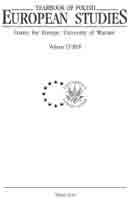Implications of the ECJ ‘Lugano II’ Opinion for European Union’s External Actions Concerning Private International Law
Implications of the ECJ ‘Lugano II’ Opinion for European Union’s External Actions Concerning Private International Law
Author(s): Monika Niedźwiedź, Piotr MostowikSubject(s): Law, Constitution, Jurisprudence
Published by: Centrum Europejskie Uniwersytetu Warszawskiego
Summary/Abstract: The remarkable ‘Lugano II’ opinion, given by the Court of Justice of the European Union in 2006 (case 1/03), has had the implications going far beyond the specific matter it decided, namely the competence of the EC to conclude the second Lugano Convention. Following ‘Lugano II’ numerous international agreements have been concluded with direct or indirect reference to the Court’s opinion as justification for the EU’s exclusive competence in a given area. This refers, among others, to the Hague Convention on the Choice of Court Agreements of 30 June 2005, the Hague Protocol of 23 November 2007 on the Law Applicable to Maintenance Obligations, and the Convention of 23 November 2007 on the International Recovery of Child Support and Other Forms of Family Maintenance. Therefore the Court of Justice, by its flexible reading of the so-called ERTA doctrine regarding the EU’s implied external competence to conclude international agreements, has created a powerful instrument for the unification of sources of private international law sensu largo (especially rules concerning conflict of laws) and the undertaking by the EU of external actions in other areas of EU law.
Journal: Yearbook of Polish European Studies
- Issue Year: 2010
- Issue No: 13
- Page Range: 129-148
- Page Count: 20
- Language: English

